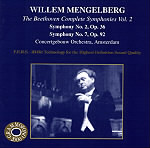While the Philips and Lys releases of Mengelberg’s live 1940 Beethoven cycle incorporate the conductor’s studio “Eroica” from the same year, Grammofono includes a live 1943 reading in grungy sound, but with heightened intensity in each movement, spilling over into a volatile Egmont Overture of similar vintage. Once you accept Mengelberg’s mannered, heavily italicized game plan, his fanatical, sometimes-eccentric attention to detail makes sense in this music. Ludicrous moments such as the horrific slowing of the Ninth’s final five chords stand alongside revelations like the taut, unsentimental finale of the “Pastoral” Symphony. There are inevitable lapses of intonation and ensemble in these live performances, yet one can’t deny that Mengelberg’s Concertgebouw was an extraordinary orchestra, and obviously rehearsed to the nines. Grammofono’s transfers resemble David Lennick’s for Music & Arts: noisy, mid-range heavy, and less open on top than the Lys or out-of-print Philips CD editions. Between-movement tuning and Mengelberg’s trademark baton raps are edited out as well. Unless you want the live “Eroica”, the Lys set remains the one to acquire.
































